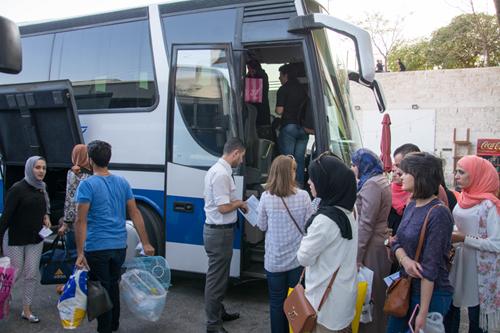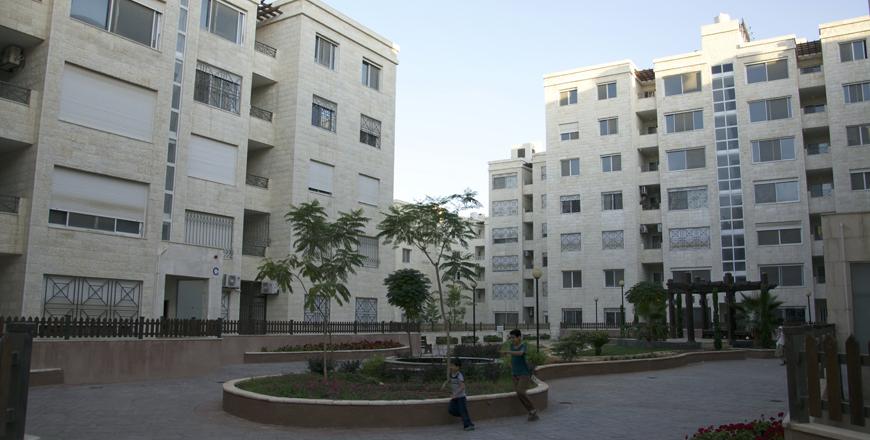You are here
Public transportation shores up Jordan Express Tourist Transport
By Samir Ghawi - Oct 03,2015 - Last updated at Oct 03,2015

Passengers boarding a JETT bus from Tabarbour station in Amman to Irbid on Saturday (Photo by Amjad Ghsoun)
AMMAN — Jordan Express Tourist Transport (JETT) is banking on public transportation to offset losses resulting from its tourist transport activities which include the Hajj.
JETT operates public transportation routes between cities in Jordan and with other cities outside the Kingdom in accordance with authorisations granted by concerned parties.
According to a disclosure sent to the Jordan Securities Commission, the company earned JD7 million during the first half of this year, 18.6 per cent less than the JD8.6 million generated during the first six months of 2014.
Of the JD7 million earned between January-June 2015, JD1.5 million came from tourist transport and JD5.5 million from public transportation, compared to JD2.4 million and JD6.2 million respectively in the same period of last year.
Tourist transport on June 30, 2015 was in the red with a JD0.5 million loss after the deduction of operational expenses, but the gross profit from public transportation amounted to JD2.7 million.
After taking into consideration administrative expenses, financing costs and other gains or losses, the mid-2015 loss from tourism transport amounted to JD1.6 million compared to a JD0.9 million loss registered on June 30, 2014.
The operations from public transportation, after subtracting the additional expenses and costs as mentioned above, resulted in JD1.9 million profit compared to a JD2.3 million profit posted during the first half of last year.
As such, collective gross profit stood at JD2.2 million, 26.7 per cent down from JD3 million during January- June 2014 and after-tax profit plunged 78.6 per cent to JD0.3 million on June 30, 2015 from JD1.4 million on June 30, 2014.
JETT's 22nd annual report covering 2014 operations, showed that the company was able to maintain a steady performance with a JD1.7 million after-tax profit and even higher earnings which reached JD16.3 million (JD15.8 million in 2013).
Nonetheless, a breakdown of last year's earnings and profit showed a negative performance in tourism transport as revenue declined by 9 per cent to JD4 million (JD4.4 million) and the loss increased to JD2.6 million (JD2.1 million).
Public passenger transport counterbalanced the drawback with higher revenue and profit that reached JD12.3 million (JD11.4 million) and JD4.4 million (JD3.8 million).
In the report, the board of directors expected 2015 earnings to hit around JD17.5 million, but also predicted a disappointing business for tourist transport.
In a foreword, Chairman Munir Nassar wrote that the company built and equipped two petrol stations in the Jordan Valley (Ghor) and Aqaba so as to save a sizeable amount in fuel costs.
Malek Haddad, JETT's general manager, told the shareholders during the general assembly meeting that the company plans to broaden its income resources with more petrol station projects.
Nassar, responding to demands for a higher rate of cash dividends, said it is not possible to distribute more than 10 per cent in light of expansion and development of new projects.
According to the external auditor's mid-year interim review of the consolidated summary of financial statements, the company bought property and equipment worth JD1.1 million during the first six months of this year. In 2014, the company sold eight old-model buses.
The chairman highlighted other achievements pointing out that in 2014 the company opened a new office in the Raghadan tourism compound (downtown Amman) to serve incoming individual tourists.
Nassar mentioned in the annual report that “JETT introduced a new tourism activity with the City Tour Bus which provide an open-topped bus service for sightseeing in Amman and Aqaba”.
When the company was contacted for further details, The Jordan Times was informed that the City Tour Bus was now operating in Aqaba and will be running in Amman at a later date.
The annual report listed three key risks facing the company, chiefly the repercussions arising from the political events and disturbances as well as the changes in neighbouring countries and their impact on various economic sectors.
Secondly, it deplored government policies related to transport, especially those concerning taxation and indicated that in this regard JETT was treated multifold compared to others in the transport business.
Thirdly, the report mentioned harmful price competition as another main risk.
In highlighting JETT's competitive position, the disclosure estimated the company's market share of tourism transport at 31 per cent indicating that it owns 109 tourist buses, or 17 per cent of the 641 buses operated by eight companies specialised in this type of activity.
The company estimated its market share of the public transport at 30 per cent indicating that, in 2014, 2.3 million passengers used its 97 buses which represent 4 per cent of the 2,500 public transport buses operating in the Kingdom.
The report referred to a study, conducted by the Land Transport Regulatory Commission, which showed that 45 million local passengers use public transportation in and between cities in Jordan and that 16 per cent of those, or 7.2 million, use buses.
Financially, the company calculated its capital investment at JD18.4 million noting that its registered and paid up capital was JD10.8 million.
By adding mandatory and voluntary reserves, each amounting to JD2.3 million and retained earnings (JD3.3 million), shareholders equity reached JD18.9 million on June 30, 2015.
JETT's liabilities totaled JD4.3 million, of which JD2.8 million were accounts payable and the remaining JD1.5 million were short and long-term debts to Cairo Amman Bank.
Total assets amounted to JD23.2 million, JD12.8 million of which were property and equipment, JD4.6 million were inventory and receivables and JD3 million were financial assets at fair value.
At the end of last year, JETT's workforce totaled 636 employees, 322 of whom worked in a subsidiary that operates public transportation routes between cities in and outside Jordan and another subsidiary that provides VIP transport service and ordinary public transportation for passengers traveling the Amman-Aqaba-Amman route.
26 shareholders accounting for 68 per cent of JETT's equity attended the general assembly meeting that approved the distribution of JD1.1 million in cash dividends at a rate of 10 per cent, a consistent figure since 2010.
Key shareholders at the end of last year included Arab Supply and Trading Corporation or ASTRA (21 per cent), Cairo Amman Bank (10 per cent), Bank of Jordan (10 per cent), Al Massira Investment Company (6 per cent), Al Zafer Investment Company (6 per cent) and Khaled Hashem Al Shawwa (5 per cent).
Related Articles
AMMAN — Production and distribution of flavoured molasses is growing Al-Eqbal Investment Company (EICO) into a roaring success.Accordi
AMMAN — Specialised Investment Compounds Company (SPIC) seems adamant on grabbing Jordan Ceramic Industries through a "difficult" merger.SPI
AMMAN — Al-Mehanya for Real Estate Investments and Housing Co.


















